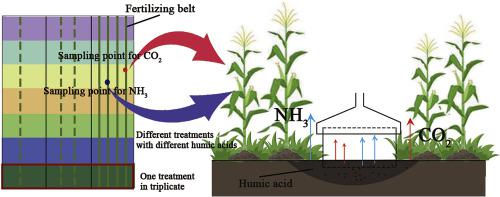Environmental Research ( IF 8.3 ) Pub Date : 2021-01-12 , DOI: 10.1016/j.envres.2021.110711 Liuying Pang , Fupeng Song , Xiliang Song , Xinsong Guo , Yanyan Lu , Shigeng Chen , Fujun Zhu , Naidan Zhang , Jiacheng Zou , Penghui Zhang

|
Humic acid can improve soil nutrients and promote plant growth. Weathered coal and lignite can be used as agricultural resources due to high humic acid content, but their impact on soil NH3 volatilization and CO2 emissions are yet to be determined. In this study, a field experiment was carried out to compare the effects of four types of humic acid isolated from coal (pulverized weathered coal (HC), pulverized lignite (HL), alkalized weathered coal (AC) and alkalized lignite (AL)) on NH3 volatilization, CO2 emissions, pH, the C/N ratio and enzyme activities in soil cultivated with maize. The effect of biotechnology humic acids (BHA) was also examined for comparison. HL, AC, AL and BHA all increased cumulative NH3 losses by 147.7, 278.5, 113.9, and 355.3%, respectively, compared with the control (chemical fertilizer only), and notably, BHA caused an increase of 90.71% compared with the humic acids isolated from coal. A significant increase in cumulative CO2 losses was observed only under AL treatment, by 14.44–24.90% compared with all other treatments. Soil urease activity was positively correlated with cumulative NH3 losses (P < 0.001), while the soil C/N ratio (P < 0.001) and soil sucrase activity (P < 0.05) were positively correlated with cumulative CO2 losses. Since humic acid from pulverized weathered coal caused no increase in NH3 volatilization or CO2 emissions, it is therefore thought to be the most suitable humic acid for field application.
中文翻译:

煤中分离的不同类型腐殖酸对土壤NH 3挥发和CO 2排放的影响
腐殖酸可以改善土壤养分并促进植物生长。风化的煤和褐煤由于腐殖酸含量高,可以用作农业资源,但它们对土壤NH 3挥发和CO 2排放的影响尚待确定。在这项研究中,进行了野外实验,比较了从煤中分离出的四种腐殖酸(粉状风化煤(HC),粉状褐煤(HL),碱化风化煤(AC)和碱化褐煤(AL))的效果。玉米栽培土壤中NH 3挥发,CO 2排放,pH,C / N比和酶活性的变化 还比较了生物技术腐殖酸(BHA)的效果以进行比较。HL,AC,AL和BHA均增加了累积NH 3与对照(仅使用化肥)相比,BHA损失分别为147.7%,278.5%,113.9%和355.3%。值得注意的是,与从煤中分离出来的腐殖酸相比,BHA造成的损失增加了90.71%。仅在AL治疗下,观察到累积CO 2损失显着增加,与所有其他治疗相比,增加了14.44-24.90%。土壤脲酶活性与累积NH 3损失呈正相关(P <0.001),而土壤碳氮比(P <0.001)和蔗糖酶活性(P <0.05)与累积CO 2损失呈正相关。由于风化煤粉中的腐殖酸不会增加NH 3挥发或CO2排放,因此被认为是最适合现场应用的腐殖酸。



























 京公网安备 11010802027423号
京公网安备 11010802027423号